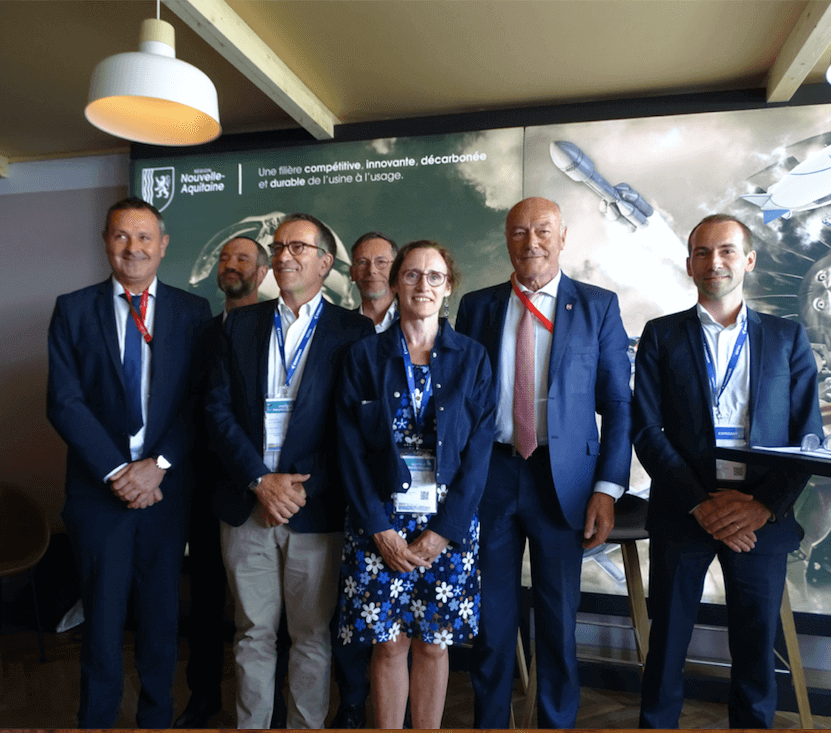Heading a consortium comprising IFP Energies Nouvelles, Avril, Axens, CEA, TotalEnergies and ThyssenKrupp Uhde within the company Bionext, Elyse Energy is to set up a biofuel production plant in the Lacq basin (Pyrénées-Atlantiques).
In his announcements ahead of the 2023 Paris Air Show on Friday June 16, French President Emmanuel Macron had already hinted at the future location of the BioTJet biofuel production plant in the Lacq basin (Pyrénées-Atlantiques), for commissioning in 2028. The chalet de la Nouvelle-Aquitaine was packed to the rafters on June 21, as Elyse Energy management presented the project in the presence of Alain Rousset, President of the Nouvelle-Aquitaine Region.
A hybrid production process
The consortium led by Elyse Energy comprises IFP Energies Nouvelles, Avril, Axens, CEA, TotalEnergies and Thyssenkrupp Uhde within the Bionext company. The BioTFuel technology enables a broad spectrum of lignocellulosic biomasses (agricultural and forestry residues) to be valorized, without competing with food uses. BioTJet is based on the version of BioTFuel technology that combines biomass conversion (torrefaction, gasification, syngas processing and Fischer-Tropsch synthesis) with external hydrogen injection to improve its low-carbon yield, thus doubling the amount of e-kerosene obtained to improve its low-carbon yield. The BioTJet project represents an investment of 1 billion euros, and the creation of at least 800 direct and indirect jobs, and is part of a larger project called E-CHO. This is the biggest investment in the Lacq basin since the discovery of a gas deposit at Lacq in 1951. The production unit will be built on a 45-hectare site in Pardies, on the former site of the Yara Frances factory. Supported by the French government and ADEME, BioTJet will meet 20% of national targets for the use of e-biokerosene in the aviation sector by 2030.
Access to biomass: a key issue
The choice of site and the provisional dimensions are based on the first phase of the feasibility study carried out by the BioTJet project partners. Once the feasibility phase has been completed, the basic engineering studies can now get underway, and the public participation phase can begin, as part of the preliminary consultation process approved by the Commission Nationale du Débat Public, with the aim of starting construction at the end of 2025 and commissioning by 2028. With a total capacity of 110,000 tonnes per year of products, including 75,000 tonnes of "e-biokerosene", BioTJet will complement the eM-Lacq project (e-methanol for maritime transport), led by Elyse Energy, consolidating the Lacq basin as one of Europe's centers of excellence for low-carbon molecules. For the production of "e-biokerosene", Elyse Energy specifies that a total of 300,000 tonnes of biomass and the mobilization of 32,000 tonnes of hydrogen per year will be required. Access to biomass will therefore be of the utmost importance. "We're in the process of setting up supply chains using agricultural waste from fruit crops, vines and olives, as well as furniture waste that can be recycled," explains Pascal Pénicaud, President and Founder of Elyse Energy. "We have until 2025 to raise the billion euros that is the plant's price tag," continues Pascal Pénicaud. The project partners previously agreed in December 2022 on the financial structuring of the BioTJet company. Five shareholders have confirmed their participation in the management committee: Elyse Energy, Avril, Axens, Bionext and IFP Investissements (the investment subsidiary of IFP Energies Nouvelles). Following this operation, Elyse Energy holds over two-thirds of the capital, with the main partners Avril, Axens and IFPI sharing the balance equally.
No airline supply commitments yet
During the project presentation, Pascal Pénicaud also clarified the discussions underway with the airlines. "When French President Emmanuel Macron unveiled the BioTJet project, Air France communicated that they were partners with Elyse Energy. We are indeed in discussions with them, but also with other airlines. But we're still only at the pre-commercial stage, and there are no supply commitments yet," concludes Pascal Pénicaud.
Découvrez cet article sur Air&Cosmos

